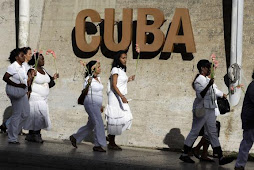Refugees pose financial challenge
By: James Whittaker | james.whittaker@cfp.ky15 April 2014
The cost of detaining and repatriating illegal immigrants, often moving
through the region on makeshift boats, is proving a challenge for many
small island nations in the Caribbean, according to a United Nations
representative.
Dr. Buti Kale, the deputy regional representative for the United Nations
High Commission for Refugees, said challenges faced in the Cayman
Islands are mirrored in neighboring countries.
He said the Turks and Caicos and the Bahamas each spent more than US$1
million last year on the issue. According to statistics from a Freedom
of Information request late last year, Cayman spent around CI$600,000 to
house, feed and repatriate Cuban migrants in 2012 and 2013.
The Cayman Islands, because of its proximity to Cuba, is one of the most
affected islands in the region, according to Dr. Kale, who was speaking
at the Red Cross in George Town on Thursday evening.
He said the standards mandated by the United Nations, under
international treaties, are fundamental. But he acknowledged that doing
the right thing could be an expensive business.
"It is not always that countries and territories do have adequate means
to provide assistance to these people. That's when the Red Cross and
others have to supplement whatever assistance the government provides,"
he said.
A delegation from the Cayman Islands government will travel to Cuba next
month to renegotiate the Memorandum of Understanding which commits
Cayman authorities to certain enforcement actions and sets out a
timetable and shared costs for returning illegal migrants.
The cost of processing, detaining and returning migrants, as well as
resettling legitimate asylum seekers, has been an issue for authorities
in Cayman.
Wesley Howell, deputy chief officer for Home Affairs with the Cayman
Islands government – also speaking at the Red Cross – suggested that
detaining illegal immigrants for extended periods of time while awaiting
authorization from Cuban authorities to transfer them, without travel
documents, adds to the financial challenge.
"We have a group of migrants who arrived on Ash Wednesday, Feb. 18 –
according to the MOU, they should be repatriated within three to four
weeks. They are still here ...
"If someone is granted asylum, then what? We have demands on
humanitarian needs that exceed the amount that our government is
committed to giving our own citizens," said Mr. Howell.
He added, "Our level of migration is three times percentage-wise what
the U.S. has to deal with. As a country with financial constraints,
there are limitations on what we can do."
Dr. Kale, who visited the detention center and met with government
officials during his brief visit, acknowledged that many countries are
facing financial challenges. He said the Bahamas government works with
nonprofit organizations to reduce costs.
"Instead of systematically detaining people, they are working with the
Church of God in order to keep people in their shelter," he said.
Cayman is one of only a handful of countries in the region that has
proper detention facilities and a processing system for migrants.
Dr. Kale believes there are issues across the region.
"In some cases, the conditions are substandard. They have to elevated.
Yes, it costs money, but it is all about abiding by international
standards," he said.
The United Nations expert also touched on an issue that has troubled
some locals – the prohibition, under the MOU, against providing support
to boatloads of migrants and helping them on their way.
"There is a unique phenomenon where people are assisted to move on. The
position of UNHCR is that when people arrive in an irregular fashion in
a country, you have got to screen them ...
"If they are going to be assisted in an onward movement, the authorities
of the arrival destination have got to be apprised of the imminent
arrival, otherwise you have a disorderly movement of people."
He said it is important to process migrants properly to find out their
circumstances and ascertain if they are entitled to asylum. He added
that it is good that people in the Cayman Islands want to help, but any
assistance has to be managed properly and not impede the official
processing.
"If someone is granted asylum, then what? We have demands on
humanitarian needs that exceed the amount that our government is
committed to giving our own citizens."
Wesley Howell, Cayman Islands deputy chief officer for Home Affairs
Source: Refugees pose financial challenge :: cayCompass.com -
http://www.compasscayman.com/caycompass/2014/04/15/Refugees-pose-financial-challenge/
Subscribe to:
Post Comments (Atom)





No comments:
Post a Comment